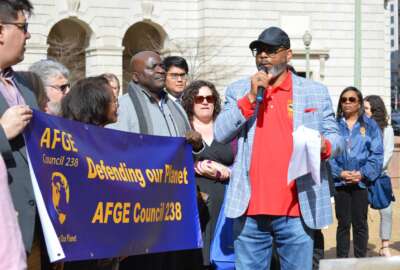Lawmakers urge EPA, AFGE to ‘bargain in good faith’ after impasse on DEIA article
Some of the article’s proposed pilot projects include installing gender-neutral bathrooms, implementing DEIA training for EPA employees and diversifying hirin...
A federal union’s calls for collective bargaining over diversity, equity, inclusion and accessibility (DEIA) at the Environmental Protection Agency are getting support in Congress.
After EPA and the American Federation of Government Employees came to a partial impasse in negotiations over a proposed DEIA contract article, a group of 44 House lawmakers is encouraging both EPA and AFGE to negotiate in good faith, specifically when it comes to DEIA.
“Though negotiations between the parties will resolve many different concerns, we encourage each party to negotiate in good faith in reaching a consensus on benefits of employment, as well as training and support programs to foster a vibrant, energized EPA workforce that reflects the breadth and scope of the American people,” the lawmakers wrote in a letter to EPA Administrator Michael Regan Tuesday.
AFGE negotiators proposed the article as a way to help solidify DEIA goals at the agency, particularly as EPA plans to hire roughly 1,800 new employees in the next year. Some of the proposed DEIA pilot projects include installing gender-neutral bathrooms, implementing DEIA training for EPA employees and diversifying hiring panels.
When coming to an impasse in May over the new contract article, EPA said, at the time, that negotiations had progressed to the point where bringing in a third-party negotiator would prove useful.
Marie Owens Powell, president of AFGE Council 238, which represents more than 7,700 EPA employees, said she hopes the push from Capitol Hill will propel forward negotiations over the remaining open articles of the contract.
“We are asking them to implement not even every suggestion that we made, but at least some of them,” Powell said in an interview. “We are at least trying to set them up as pilots where they can take on a smaller scale, then take a step back and say, ‘yes, this worked,’ or ‘no, it didn’t work’ — and they just won’t do it.”
An EPA spokesperson said the agency has already devoted “significant resources” to reaching an agreement over the DEIA article, with the agency and the union exchanging proposals for its provisions.
“The parties have agreed to language for several elements of the article,” the agency spokesperson said.
EPA and AFGE moved a handful of other articles to an impasse, including provisions on career ladders and performance evaluations. The two parties plan to negotiate on the remaining open articles before turning to the articles now requiring a third-party negotiator.
Many other articles have seen positive progress in negotiations, which began after the two parties restored collective bargaining in 2021. AFGE and EPA have already implemented 14 articles of the new collective bargaining agreement and have tentative agreements on nine more.
The work will all take place in the coming months before the current collective bargaining agreement expires next summer. EPA said the two parties have made “excellent progress” in negotiations so far and expect to continue on that path.
“We continue to work on the remaining articles as we make progress toward having a full agreement by the time the current agreement expires,” an EPA spokesperson said in an email.
AFGE initially proposed adding a DEIA article to EPA’s collective bargaining agreement in June 2022. But with the new push from Congress, Powell said she’s looking to get through the rest of the articles “as soon as possible.”
“We want to get through the actual negotiations to move forward to mediation, and then we’ll be able to figure out what we have left for impasse and get into that whole cycle,” she said.
Despite coming to the impasse in collective bargaining, EPA said it remains “very committed” to advancing DEIA and pointed to other efforts already underway at the agency.
For example, following the 2021 executive order on DEIA, EPA commissioned a DEIA implementation team in August 2021 to work on developing and implementing a DEIA strategic plan.
EPA’s DEIA plan is “based on over 500 comments received from eight workgroups, and translated into a detailed roadmap to track efforts across the agency, ensuring goals are accomplished timely,” an agency spokesperson said in an email.
Additionally, 98% of EPA’s supervisors and managers have attended trainings and discussions on unconscious bias, the spokesperson added.
Still, Powell said the disparity between the agency’s words and actions for DEIA has been frustrating.
“We are trying to ensure that all of our current employees are recognized and accepted for the vast amounts of diversity that we have, and that our new hires that are brought in reflect those communities that we serve,” Powell said.
Copyright © 2024 Federal News Network. All rights reserved. This website is not intended for users located within the European Economic Area.
Drew Friedman is a workforce, pay and benefits reporter for Federal News Network.
Follow @dfriedmanWFED






